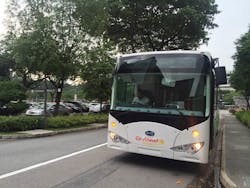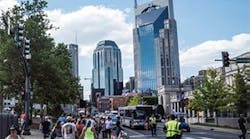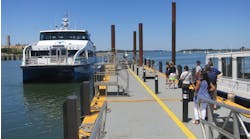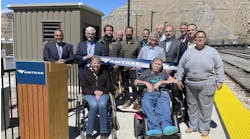BYD has announced that it will trial a pure electric bus in Singapore.
Currently, Singapore’s public bus market uses buses with internal combustion engines fueled by diesel. The 6-month-long trial will see BYD’s k9 bus – which runs fully on electricity – introduced into Go Ahead SG’s bus services operating from Loyang Depot. Other than Singapore, BYD had also partnered Go Ahead in the UK, where one of their pure electric buses successfully operated for two and a half years. BYD pure electric buses and taxis also operate in over 200 cities, including Los Angeles, Kyoto and Kuala Lumpur to help cities reduce carbon emissions and offer quieter and more comfortable ride for residents.
Liu Xueliang, general manager of BYD Asia Pacific Region said, “Working with LTA, Smart Group and Go-Ahead, it’s a great honor for BYD to bring the first pure electric bus to Singapore. Electric buses have the potential to reduce carbon emission and improve air quality for a better living environment. BYD is committed to providing green and sustainable comprehensive ground transportation including e-buses, e-taxis, e-vans, as well as e-trucks etc.”
Dr. Bhupendra Kumar Modi, founder of the Smart Group said, “Our ultimate aim to provide affordable and pollution-free transport to Singapore. It is therefore important that we provide the operator and authority with a first-class product and support network.”
According to findings published in the E-Mobility Technology Roadmap for Singapore, fleet vehicles such as public buses and taxis offer the biggest potential for electrification. Presently, there are nearly 18,000 public and private buses in service on Singapore’s roads, representing about 2 percent of the existing vehicle population. With an average of 227km travelled daily on roads, buses are the second highest daily utilised fleet vehicles in operation. This is especially so for public buses, which run about 18 hours and travel an estimated peak of 250km each day.
BYD’s 6-month trial will look into the challenges of whether an electric bus can meet the full-day operational demands of a conventional public bus, without compromising on reliability and serviceability, in a local environment. It is also part of Singapore’s EV Phase 2 Test-bed co-led by the Land Transport Authority (LTA) and Economic Development Board (EDB), which is aimed at exploring fleet-based operations such as EV car-sharing, electric buses and electric taxi fleets. The k9 bus, which is 12metres-long, has an 80-passenger capacity and is wheelchair accessible. The bus uses the company’s proprietary long-cycle, fire-safe, non-toxic iron-phosphate battery with in-wheel hub motors and regenerative braking. The bus takes five or ten hours to fully charge from zero to one hundred per cent. It has a 250km range, which is sufficient for a full day of service. The bus is built according to local buses requirements.
BYD will implement the necessary charging infrastructure to support its operation within Loyang bus depot. Its charging standard is compliant with the International Electrotechnical Commission (IEC) Type 2 standard, and is aligned with Singapore’s national public charging standard for new EV charging stations, and allows for normal and semi-fast charging of EVs.




